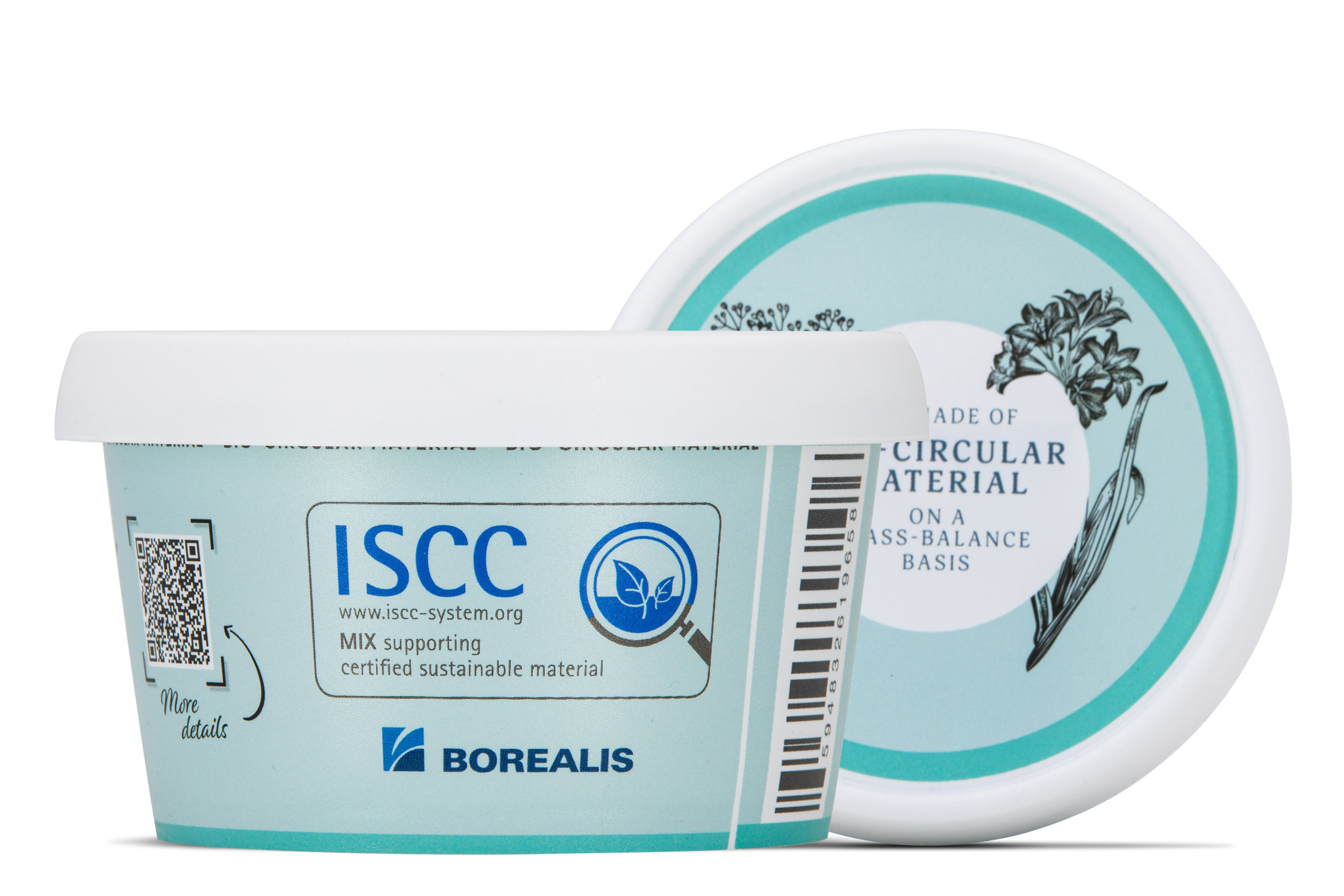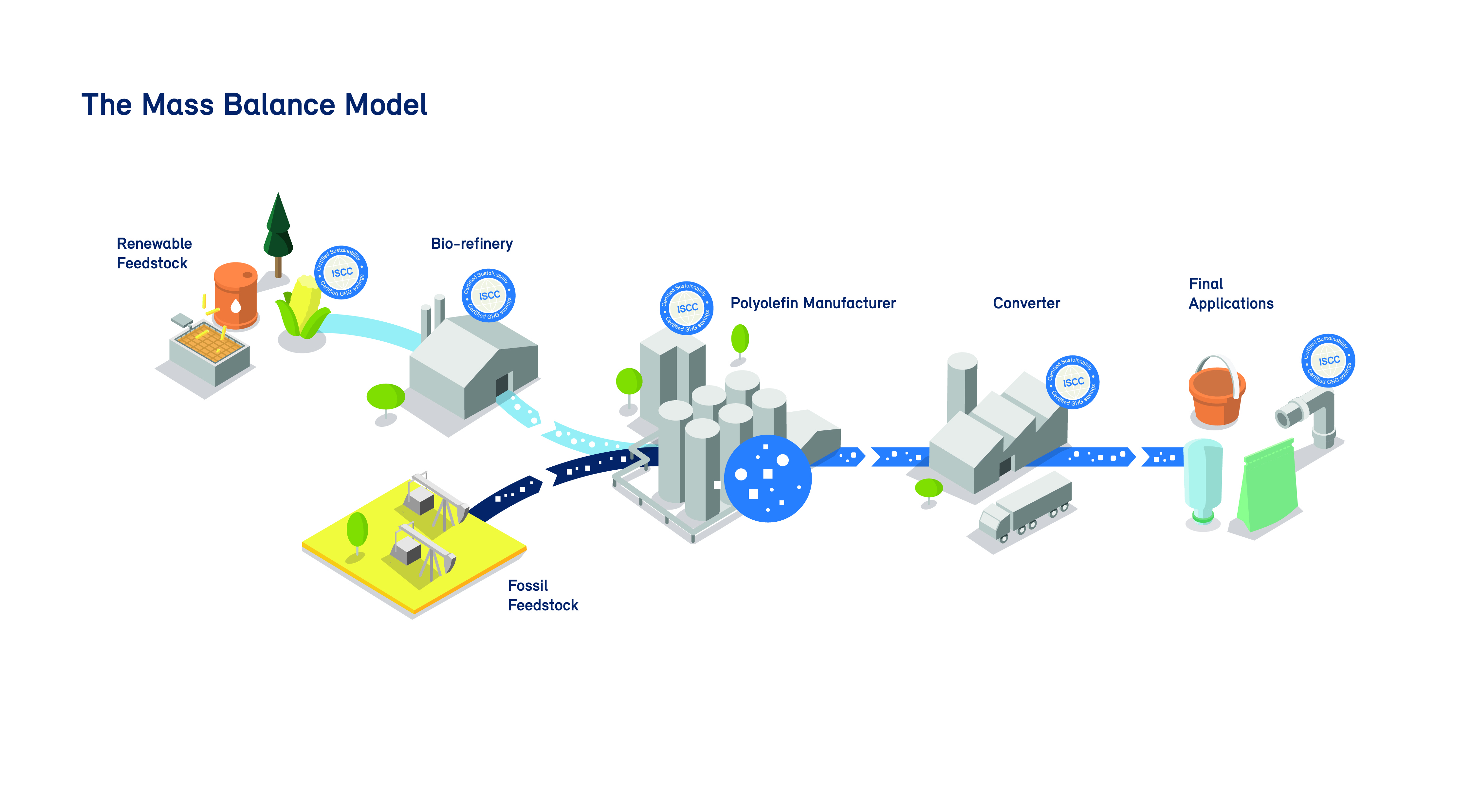By using the Bornewables™ portfolio, Greiner Packaging is for the first time incorporating renewable resources in the production of food cups made of polypropylene (PP) with in-mold labeling (IML) as the decoration technology. Initial prototypes of the cups are available now. The new premium polyolefins designed for circularity by Borealis offer a host of advantages:
Greiner Packaging is pursuing various approaches to make its packaging solutions as sustainable as possible. One course of action is to use so-called circular materials – that is, renewable, non-fossil fuel feedstocks. For the first time, the packaging manufacturer has now produced a food cup made of premium polyolefins obtained exclusively from waste and residue streams. The Bornewables line of products is manufactured by Borealis, a leading supplier of polyolefins based in Vienna, Austria.
Unlike renewable raw materials produced with agricultural crops grown for food and livestock feed, the Bornewables products are made from second-generation (i.e., renewably sourced) feedstocks derived solely from waste and residue streams: from vegetable oil production as well as oil waste and residues, from the timber industry, or from the food industry – for instance, used cooking oil.
The Bornewables offer the same characteristics as virgin polyolefin materials while boasting a substantially reduced carbon footprint. “The Bornewables portfolio represents a key step in our efforts to offer products decoupled from traditional feedstock, with the aim of providing a solution to the CO2 challenge. Through this product range, we are helping our customers and the value chain achieve their own sustainability targets, maintain their existing quality standards, and provide packaging solutions that are approved for food contact. We focus on the needs of our customers and the value chain as we work to drive the transition to a circular economy for plastics,” says Trevor Davis, Head of Marketing, Consumer Products at Borealis.
A life cycle analysis initiated by Borealis at its Kallo site in Belgium, showed that using Bornewables substantially reduces a product’s carbon footprint by at least 2.7 kg CO2eq for every kilogram of polymer. This represents a saving of up to 120 percent in comparison to fossil-based PP from Borealis and roughly equates to charging 2,700 smartphones in a year*. Moreover, using these premium polyolefins designed for circularity reduces the depletion of fossil resources by around 69 percent. The entire Bornewables line of products has been certified as part of the ISCC PLUS (International Sustainability & Carbon Certification) system. This chain of custody certification guarantees customers that the feedstock used in the material is certified as renewable and sustainably produced and can be traced to its point of origin. Certification is based on the mass balance approach, which means that a contribution to the use of chemically recycled or renewable materials is made in every material stream. A number of Greiner Packaging’s locations are also already ISCC PLUS certified.
The new prototype IML cups for dairy products are made of Bornewables monomaterial and were developed to be recycled as normal in conventional facilities – completely in line with the principle of design for recycling. The chemical structure of the PP material used in the cups is similar to that of standard plastic and can be recycled in the same loop as conventional polymers. This is a great example of how the packaging specialists at Greiner Packaging take into account sustainability from the very start. “Concepts like our new IML food cups only work when all partners along the entire value chain get involved and share the same sustainability targets – from feedstock suppliers through to brand owners. As a packaging producer, we support these efforts in the context of our own circular economy strategy and pursue new approaches alongside partners and suppliers like Borealis,” says Stephan Laske, R&D Director at Greiner Packaging.
* source: Charging for 2 hrs at 6W in EU (2018) at ~230grCO2/kWh
On this same topic, the first virtual Greiner Packaging Innovation Days 2021 will include a live talk on 9 June with the subject “Climate change: Act now – with biocircular materials.” The presentation will be given by Stephan Laske, R&D Director at Greiner Packaging, and Trevor Davis, Head of Marketing for Consumer Products at Borealis. Guests will have the opportunity to learn more about the Bornewables and how the use of these premium circular polyolefins in Greiner Packaging’s solutions can support efforts to overcome the challenges posed by climate change. They will also have the chance to put their questions directly to both experts.
END
Media contacts
| Borealis Group Communications Virginia Mesicek Senior Manager, Corporate Communications, Brand & Reputation tel.: +43 1 22 400 772 (Vienna, Austria) e-mail: Virginia.Mesicek@borealisgroup.com | Greiner Packaging Roland Kaiblinger Account Executive SPS MARKETING GmbH | B 2 Businessclass |Linz, Stuttgart tel. +43 (0) 732 60 50 38-29 e-mail: r.kaiblinger@sps-marketing.com |

New prototype in-mold labeling cup produced by Greiner Packaging, made of renewable (bio-circular) polypropylene from Borealis (Bornewables™).
© Greiner Packaging. image. 550kb
The mass balance model for the Bornewables range from Borealis encompasses the entire value chain.
© Borealis. image. 1.1mbAbout Borealis
Borealis is one of the world’s leading providers of advanced and circular polyolefin solutions and a European market leader in base chemicals, fertilizers, and the mechanical recycling of plastics. The company leverages its polymers expertise and decades of experience to offer value-adding, innovative, and circular material solutions for key industries. In reinventing for more sustainable living, Borealis builds on its commitment to safety, its people, and excellence as it accelerates the transformation to a circular economy and expands its geographical footprint.
With head offices in Vienna, Austria, Borealis employs around 6,900 employees and operates in over 120 countries. In 2020, Borealis generated EUR 6.8 billion in sales revenue and a net profit of EUR 589 million. Austrian-based international oil and gas company OMV Group owns 75 percent of Borealis, while the remaining 25 percent is owned by a holding company controlled by Mubadala, which is headquartered in the United Arab Emirates. Borealis supplies services and products to customers around the globe together with two important joint ventures: Borouge (with the Abu Dhabi National Oil Company, or ADNOC, based in the UAE) and Baystar™ (with Total, based in the US).
About Greiner Packaging
Greiner Packaging is a leading European manufacturer of plastic packaging in the food and nonfood sectors. The company has enjoyed a reputation for outstanding solutions expertise in the fields of development, design, production, and decoration for more than 60 years. Greiner Packaging responds to the challenges of the market with two business units: Packaging and Assistec. While the Packaging unit focuses on innovative packaging solutions, the Assistec unit is dedicated to producing custom-made technical parts. Greiner Packaging employs a workforce of nearly 4,900 at more than 30 locations in 19 countries around the world. In 2020, the company generated annual sales revenues of EUR 692 million (including joint ventures), which represents more than 40 percent of Greiner’s total sales.
For further information:
www.borealisgroup.com
www.borealiseverminds.com
www.greiner-gpi.com
Baystar and Bornewables are trademarks of Borealis AG.
Thank you for understanding that we are only able to respond to media enquiries. For all other inquiries, please reach out to us via these contact forms.
Media representatives can reach our media desk during work days in Austria between 8:30 a.m. and 17:00 p.m. (CET) via email or telephone.
High-resolution images and videos are available for download in our media gallery.
Group Media Desk
+43 1 22 400 899 (Vienna, Austria)